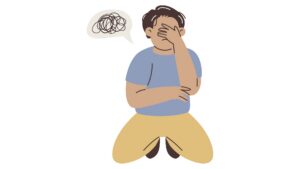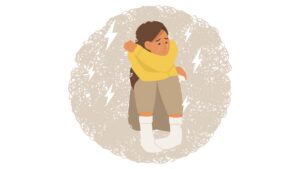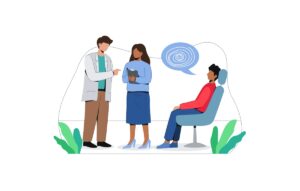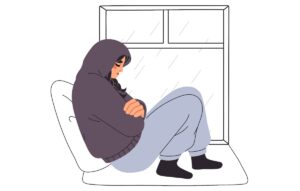Trauma is one of the most significant but often overlooked challenges facing today’s young adults. Between ages 15 and 25, individuals are navigating enormous life transitions—leaving home, beginning college or careers, forming new relationships—while still developing emotionally and neurologically. When a traumatic experience enters the picture, it can disrupt this crucial stage of growth and leave lasting effects.
For some, trauma comes from a single event, like a car accident, a sudden loss, or an act of violence. For others, it develops from repeated or long-term exposure to stressors such as abuse, neglect, bullying, or instability in the home. While many people experience traumatic events in their lives, not everyone develops post-traumatic stress disorder (PTSD). PTSD occurs when the brain and body remain “stuck” in survival mode long after the danger has passed, making it difficult to feel safe, trust others, or function in daily life.
Understanding how trauma and PTSD show up in young adults is critical—not only for those experiencing it but also for parents, caregivers, and educators who want to help. Left untreated, PTSD can lead to isolation, academic struggles, substance use, and serious mental health challenges. With the right support and evidence-based treatment, however, recovery is not only possible but achievable.
What Trauma Looks Like in Young Adults
Trauma doesn’t affect every young adult in the same way. Some may appear withdrawn and anxious, while others mask their pain with irritability or high-risk behaviors. Recognizing the variety of trauma responses is key to getting timely help.
Common sources of trauma in this age group include:
- Accidents or sudden injuries (such as car crashes or sports injuries).
- Abuse or neglect during childhood or adolescence.
- Sexual assault or intimate partner violence.
- Witnessing or experiencing violence in schools, communities, or online spaces.
- Sudden loss of a loved one, divorce, or family conflict.
- Bullying and cyberbullying, which can leave deep emotional scars.
- Medical trauma, such as prolonged hospitalizations or serious diagnoses.
Because young adults are still building their sense of identity and independence, traumatic events can feel especially destabilizing. Even when they try to “move on,” unresolved trauma may show up in subtle ways, difficulty trusting relationships, fear of new experiences, or a sense of being “different” from peers.
Trauma-related stress can disrupt how emotions are processed and regulated, often leading to emotional dysregulation in young adults, especially in situations that feel unpredictable or emotionally charged.
Signs and Symptoms of PTSD in Young Adults
Not every young adult who experiences trauma will develop PTSD, but it’s important to recognize when symptoms go beyond temporary stress. PTSD symptoms typically last more than a month and interfere with daily functioning.
Emotional symptoms:
- Intense anxiety, irritability, or mood swings.
- Emotional numbness or feeling detached from others.
- Persistent feelings of guilt, shame, or hopelessness.
Behavioral symptoms:
- Withdrawing from family and friends.
- Avoiding places, people, or activities that trigger reminders of the trauma.
- Increased risk-taking behaviors or substance use as a coping mechanism.
Physical symptoms:
- Difficulty falling or staying asleep, frequent nightmares.
- Hypervigilance—always feeling “on edge” or easily startled.
- Unexplained physical complaints such as headaches or stomach pain.
Impact on academics or work:
- Trouble focusing or remembering assignments.
- Declining grades or missed work responsibilities.
- Struggles to maintain consistent routines.
If you notice several of these symptoms persisting in yourself or your loved one, it may be a sign that trauma has progressed into PTSD. The earlier professional support is sought, the better the chances for long-term recovery.
Trauma, PTSD, and Co-Occurring Disorders
Another challenge for young adults is that PTSD rarely exists in isolation. Many who experience trauma also develop co-occurring conditions such as depression, anxiety, substance use disorders, or ADHD.
For example, a college student coping with trauma might start drinking heavily to manage anxiety or turn to stimulants to deal with lack of sleep. Others may experience panic attacks or fall into cycles of self-blame and self-harm. These overlapping struggles make trauma-informed care essential.
At Protected Roots Integrative Treatment Center (PRI), we recognize that healing PTSD often means addressing the full picture—not just the traumatic memories, but also the mental health and behavioral challenges that develop alongside them.
Evidence-Based Treatments for Trauma and PTSD
The good news: PTSD is treatable. With the right therapies and supports, young adults can heal and move forward. At PRI, treatment is tailored to each individual’s needs using a combination of evidence-based therapies and holistic practices.
Therapies that work for trauma and PTSD include:
- Cognitive Behavioral Therapy (CBT): Helps individuals reframe negative thought patterns and regain control over intrusive memories.
- Dialectical Behavior Therapy (DBT): Builds skills for emotional regulation, distress tolerance, and healthier relationships.
- Eye Movement Desensitization and Reprocessing (EMDR): A specialized therapy that helps reprocess traumatic memories so they are no longer as distressing.
- Trauma-Informed Care: Every aspect of treatment is designed to create a sense of safety and empowerment.
Holistic supports may include:
- Mindfulness and meditation practices.
- Art or music therapy for creative self-expression.
- Nutrition counseling to strengthen physical health.
- Physical activity or outdoor therapy to release stress.
Levels of care available at PRI:
- Partial Hospitalization Program (PHP): A higher level of care providing daily therapeutic structure without full hospitalization.
- Intensive Outpatient Program (IOP): More structured support, multiple days per week.
- Outpatient (OP): For those who need weekly sessions while maintaining school or work.
- Telehealth options: Virtual therapy and group sessions for young adults who need flexible or remote access to care.
This range of options ensures young adults receive the right level of support at the right time, whether they are just beginning therapy or stepping down from a higher level of care.
How Families and Caregivers Can Help
Parents and caregivers play an essential role in recovery. Supporting a young adult through trauma and PTSD isn’t about having all the answers—it’s about showing up with consistency and compassion.
Ways families can help:
- Recognize the signs early. If your young adult is showing lasting changes in behavior, don’t dismiss them as “a phase.”
- Open up communication. Encourage honest conversations without judgment or pressure.
- Participate in family therapy. Structured sessions help improve communication, set boundaries, and build trust.
- Support healthy coping. Encourage activities that promote resilience, such as exercise, journaling, and connecting with supportive peers.
When families are engaged in treatment, young adults feel less isolated and more motivated to embrace recovery.
Joint Commission Accreditation, DHCS License,
& Clinical Partnership with CPCMG
Joint Commission Accreditation, DHCS License, & Clinical Partnership with CPCMG
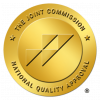
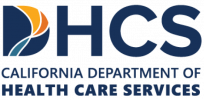


In Clinical Partnership With
PRI Treatment Center is proud to clinically partner with Children’s Primary Care Medical Group San Diego to expand access to high-quality mental health services. Together, we’re bridging the gap between primary care and mental health to better support the well-being of children and families in our shared community.
When to Seek Professional Help
It’s time to reach out for professional help when:
- Symptoms last more than a month and interfere with school, work, or relationships.
- Your young adult is using substances to cope with trauma.
- There are signs of self-harm or suicidal thoughts.
- Family efforts alone aren’t enough to bring relief.
Untreated PTSD can worsen over time and put young adults at risk of long-term struggles. Seeking help early can prevent years of unnecessary suffering.
At PRI, our trauma-focused programs are designed to meet young adults where they are—providing compassionate care, structured support, and evidence-based tools for lasting recovery.
Call PRI Treatment Center today or verify your insurance benefits to cover the cost of treatment.
Frequently Asked Questions
What causes PTSD in young adults?
PTSD can develop after exposure to a traumatic event such as abuse, violence, accidents, or sudden loss. Not every person exposed to trauma develops PTSD, but those with repeated or severe trauma are at higher risk.
How is trauma different from PTSD?
Trauma refers to the distressing event itself. PTSD is a mental health condition that may develop afterward, marked by intrusive memories, avoidance, and lasting emotional impact.
Can PTSD go away without treatment?
Some people recover naturally over time, but many need professional treatment to address symptoms and prevent worsening. Evidence-based therapies significantly improve outcomes.
What treatments are most effective for PTSD?
CBT, DBT, EMDR, and trauma-informed therapies are considered highly effective. Treatment often combines therapy with holistic supports and family involvement.
How long does treatment for PTSD take?
The timeline varies depending on severity, co-occurring conditions, and the level of care. Some young adults make significant progress in a few months, while others benefit from longer-term support.
Trauma and PTSD in young adults can feel overwhelming, but healing is possible. With compassionate support, evidence-based care, and a safe environment, young adults can learn to manage symptoms, rebuild confidence, and thrive in their futures.
If you or a loved one is struggling with the effects of trauma or PTSD, Protected Roots Integrative Treatment Center offers specialized programs for young adults in La Jolla, San Diego, and through virtual therapy. Recovery starts with one step—reach out today to learn how PRI can help.
Key Takeaways
- Trauma in young adults can stem from accidents, abuse, bullying, or sudden loss, and often disrupts emotional and academic development.
- PTSD symptoms may include nightmares, avoidance behaviors, hypervigilance, and withdrawal from school, work, or relationships.
- Untreated PTSD is linked to depression, anxiety, and substance use—but evidence-based therapies like CBT, DBT, and EMDR can help.
- Early intervention and family support are key: young adults recover best with integrative, trauma-informed care tailored to their needs.
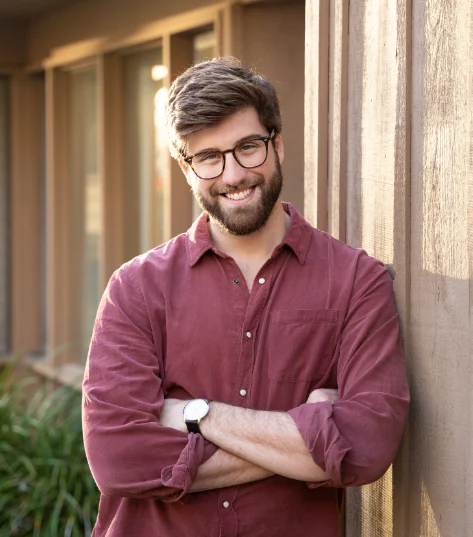
Dr. Warter received his doctorate in Clinical Psychology from The Wright Institute in Berkely, California, completed his Predoctoral Internship at USC’s Children’s Hospital Los Angeles, and was a Postdoctoral Researcher at USC’s Institute for Integrative Health and Wellness. Dr. Warter has also been trained at UCSF School of Medicine, Kaiser Permanente, and in community clinics in rural, underserved communities in Argentina and Paraguay. Dr. Warter has received training in providing parents with guidelines to help prevent behavior problems and enhance communication skills and strategies to promote children’s social, emotional, and academic competence. Dr. Warter has also published and presented at the University of Naples and the University of Buenos Aires on subjects related to Third Culture Kids and the impacts of Social Media on Personality and Self Esteem.

